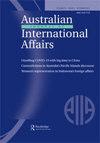南极不断变化的价值对澳大利亚安全政策的影响
IF 1.8
3区 社会学
Q2 INTERNATIONAL RELATIONS
引用次数: 0
摘要
南极是世界气候的重要调节者,随着环境安全渗透到全球安全中,利用南极科学更好地了解气候变得越来越紧迫。尽管澳大利亚政府已经认识到气候变化构成了“当前和存在的国家安全”威胁,并承认南极洲对地球全球气候系统的重要性,但澳大利亚情报界有关南极洲的重点目前仍局限于维护南极条约系统(ATS)的军事安全和外交目标。目前的重点是通过“ATS工作”来对冲在冰冻大陆上或上空发生冲突的可能性,然而,本文认为南极气候科学具有更大的能力,可以为澳大利亚提供安全成果。南极气候科学为南极洲的情报提供了机会,即确保澳大利亚的南极利益,以及来自南极洲的情报;通过加强自然灾害准备,支持更广泛的战略规划,以及进一步加强外交和澳大利亚在这片冰冻大陆上的领导地位的合法性。建议联邦政府建立一个气候情报工作组,以确保气候科学对安全和情报的效用得以实现。本文章由计算机程序翻译,如有差异,请以英文原文为准。
The changing value of Antarctica to Australia’s security policy
ABSTRACT Antarctica is a crucial regulator of the world’s climate, and as environmental security permeates global security, using Antarctic science to better understand climate is becoming increasingly pressing. Although the Australian Government has recognised that climate change poses ‘a current and existential national security’ threat and has acknowledged Antarctica’s importance regarding the earth’s global climate system, the focus of Australia’s intelligence community pertaining to Antarctica currently remains restricted to upholding the military-security and diplomatic goals of the Antarctic Treaty System (ATS). This current focus aims to hedge against the possibility of conflict on, or over, the frozen continent via ‘working the ATS’, however, this paper argues that Antarctic climate science holds a greater capacity to deliver security outcomes for Australia. Antarctic climate science offers opportunities regarding intelligence for Antarctica, that is, securing Australia’s Antarctic interests, as well as regarding intelligence from Antarctica; by enhancing natural disaster preparedness, bolstering broader strategic planning, as well as furthering diplomacy and the legitimisation of Australia’s leadership on, and over, the frozen continent. It is recommended that the Commonwealth Government establish a climate intelligence working group to ensure the utility of climate science to security and intelligence is realised.
求助全文
通过发布文献求助,成功后即可免费获取论文全文。
去求助
来源期刊

Australian Journal of International Affairs
INTERNATIONAL RELATIONS-
CiteScore
3.20
自引率
13.30%
发文量
44
期刊介绍:
AJIA is the journal of the Australian Institute of International Affairs. The Institute was established in 1933 as an independent and non-political body and its purpose is to stimulate interest in and understanding of international affairs among its members and the general public. The aim of the Australian Journal of International Affairs is to publish high quality scholarly research on international political, social, economic and legal issues, especially (but not exclusively) within the Asia-Pacific region. The journal publishes research articles, refereed review essays and commentary and provocation pieces. ''Articles'' are traditional scholarly articles. ‘Review essays’ use newly published books as the basis to thematically examine current events in International Relations. The journal also publishes commentaries and provocations which are high quality and engaging pieces of commentary, opinion and provocation in a variety of styles. The Australian Journal of International Affairs aims to analyse international issues for an Australian readership and to present Australian perspectives to readers in other countries. While seeking to stimulate interest in and understanding of international affairs, the journal does not seek to promote any particular policies or approaches. All suitable manuscripts submitted are sent to two referees in a full ''double blind'' refereeing process.
 求助内容:
求助内容: 应助结果提醒方式:
应助结果提醒方式:


